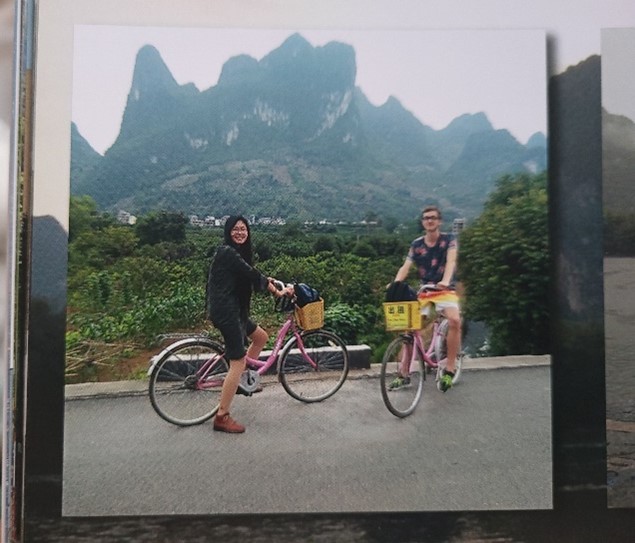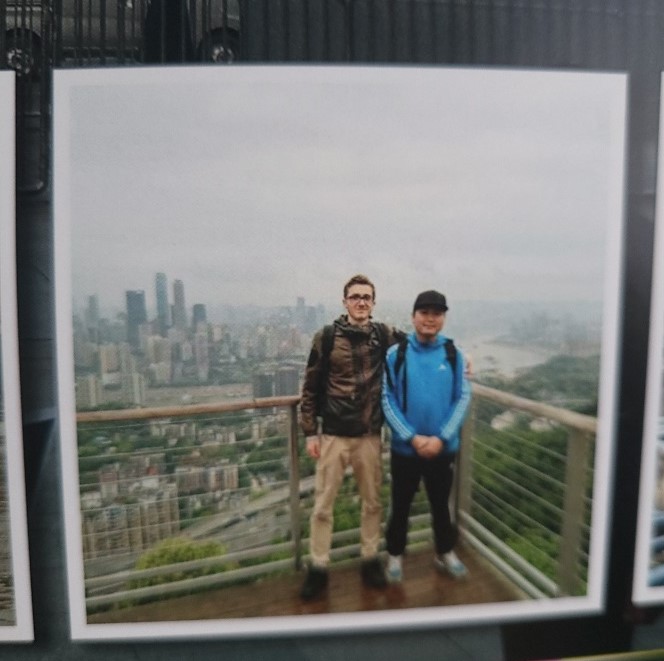You’re young and have plans. And my plan was to travel to China. After completing my secondary school education, I swapped the rut of the learning factory for the life of a backpacker. I travelled through Asia for four months, of which a month was spent in the Chinese interior. Using the largest high-speed rail network in the world, I explored bustling metropoles, nature reserves with bizarre landscapes, breathtaking glass skywalks, and small hovels that may never have been visited by a white foreigner.

From my photo album: cycling through the South Chinese Yangshuo mountains
Immersed in a completely different culture, I experienced the most enriching, interesting and fun months of my life. The unrivalled hospitality turned The Great Unknown into a warm bath. If I sneezed in the park, I was quickly handed a tissue by complete strangers. People I had never met paid my bus fare if I failed to have the required exact change. Chinese students and scholars, having studied the English language for years, saw me as an excellent opportunity to test their command of the language on a “genuine foreigner”. The interesting interactions with the local population made me feel like a globetrotter rather than a tourist. They impressed me with their mindset focused on the collective; I impressed them with my ability to cycle hands-free. How about that for cultural exchange?
They impressed me with their mindset focused on the collective; I impressed them with my ability to cycle hands-free

In a hostel in Chongqing, a city of 9 million, I met the Chinese boy, Adrian. Together, we explored the city, meanwhile discussing all sorts of topics without predetermined goals or agendas. ‘How do you feel about democracy?’ he asked. He told me that his school had taught him that (liberal) democracy leads to chaos and, hence, does not serve the people. Chaos and hassle are a strong argument against. However, I had excellent arguments in favour of democracy. Our talks were candid. And comfortably free of consequence, after a few days, we went our separate ways. Open and honest discussions based on mutual respect and a genuine interest in each other’s perspective. And these are the two essential ingredients that are also needed in the current discussion about ‘WUR and China’.
The article in Resource and the resulting outrage is the reason I am sharing some of my experiences. The discussion has derailed. Resource acknowledged that a certain statement had been careless, and they rectified it. On the other hand, the issues discussed are too important to be pushed aside; the present situation is considered problematic by a good number of parties involved. In reactions (from both the Chinese and the non-Chinese community), the voiced concerns are denied or downplayed. Asian hate and racism exist and are important issues worth discussing. At the same time, criticism of the way CSC PhD students are currently treated should be open for debate.
Criticism of the way CSC PhD students are currently treated should be open for debate
A small selection of the concerns that are felt within WUR. First: is the fact that a group of PhD students is paid well below the minimum fair and desirable? Second: WUR is not paying the Chinese CSC PhD students but is still the recipient of the PhD bonus provided by the Dutch government, which is designed to fortify the Dutch knowledge economy, while these doctors frequently leave the country once they have obtained their PhD. Third is the question of to what degree lack of freedom (such as avoiding certain topics, self-censorship) in China makes its way to Wageningen. A Swedish university has ceased to accept CSC students entirely following an incident. Should WUR actively develop policies in this regard? Are there PhD candidates, employees and students from other countries where this may be an issue?
I hope that ‘talk with us, not about us’ is taken to heart and given a spot in the next edition of the magazine
Back to the constructive discourse. The concerns expressed in the article are related to policymakers, not to well-meaning Chinese PhD candidates contributing to science. Despite the fact that the criticism is not directed at individual PhD students, the strong reactions show that theirs is a perspective they want to share. I hope that ‘talk with us, not about us’ is taken to heart and given a spot in the next edition of the magazine. The comfort of the candid talks I experienced during my travels in China is lacking in this situation, but a normal, constructive discussion should be possible.
Steven is doing a Master’s degree in Economics and Policy and enjoys hitting the squash court. He is always up for a game of squash and a good conversation. You can email him here.


Dear Resource,
You did something wrong in the first place, which you clearly acknowledged and, in your own words, regretted. It would be extremely naïve to expect that the recipient of such misconduct-the Chinese community-should be setting up a warm welcome for you to the table full of food and start the conversation again with smiles as if nothing has happened. Something has happened, and you did it wrong. We, the Chinese community, seemed to have a reputation for not caring too much, or not fighting back. Well, time has changed and so have we.
We have a saying in Chinese that goes “A wound can heal but the pain will not be forgotten”. This is what you are dealing with right now. We are absolutely open to discussions, even though they sometimes, more often than not, come with a pre-determined answer. Similar to the discussion about democracy that I was too frequently asked about. A discussion is about sharing, while a quarrel is about winning. And often, if not always, such “discussion” felt more like a quarrel.
If you regret what you have done, if you believe that things could have been done better if you care what your readers think and feel after reading what you have published. And, if you want to restart a conversation or a proper discussion. Perhaps try apologizing first? Even if you did something unintentionally, like if you accidentally stepped on someone, you would have no problem apologizing, wouldn’t you?
We can wait, but the longer we wait, the more damage is being done.
Sincerely yours,
Yongran
The chief editor’s grovel and mea culpa in the current edition of Resource was painful. To me the point of a magazine like Resource is to initiate discussions. Someone with a ‘spicy’ opinion puts in a piece, and discussion ensues. This culture or self-chastising and relentless censorship needs to go. And this goes beyond ‘China-gate’.